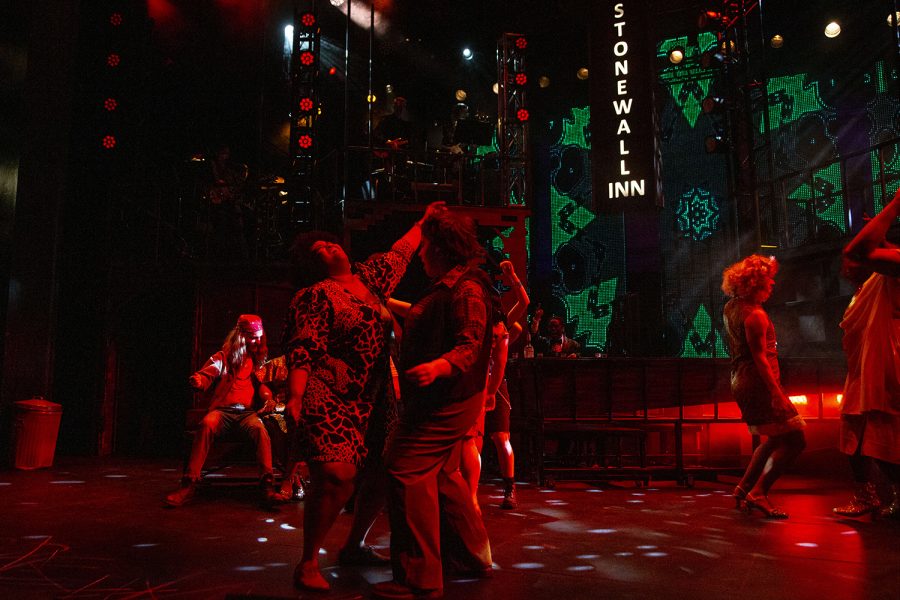Opinion | LGBTQ+ history deserves to be taught in schools
The LGBTQ+ community has influenced American culture, and their history deserves to be taught.
Actors dance during the Hit the Wall dress rehearsal in the Theater Building on Tuesday, Jan. 28, 2020. Hit the Wall depicted the violence of Stonewall riots.
March 8, 2021
I didn’t fully understand what the Stonewall riots were until I was 19 years old. I’d been slowly coming out of the closet for about 6 months before I attended the University of Iowa theatre department’s production of “Hit The Wall”.
This musical portrayed the night that cemented The Stonewall Inn in LGBTQ+ history. I’d seen on social media that the riot acted as a catalyst for LGBTQ rights, but I didn’t fully grasp the magnitude of what happened.
I left the show wondering why the Stonewall riots, or really any major event regarding the LGBTQ+ community, hadn’t been covered in my U.S. history classes growing up.
Regardless of your opinion on the LGBTQ+ community, you can’t deny the impact it has had on U.S. history, culture and legislation. Omitting the stories of Stonewall, the death of disco, and those who fought for same sex marriage, erases them. We must acknowledge people who have contributed so much to U.S. culture.
The forefront of American tonalism was born from a group of composers referred to as “the gay mafia” within the classical music world. Aaron Copland, Virgil Thomson, Leonard Bernstein and more were a part of this group. The idea of not combining a composer’s sexuality and work to equate its relevance wasn’t widely accepted until the 1990s.
American writer Truman Capote authored the first nonfiction novel. His book “In Cold Blood” brought about the new genre of writing that combined journalism and creative writing.
Christine Jorgensen was the first openly out transgender woman in the U.S. She paved the way for pioneering trans actress Laverne Cox to bring transgender visibility to the screen.
And we can’t forget the countless LGBTQ creatives who have contributed to various areas of art like artist Jean-Michel Basquiat, musician Janis Joplin, fashion designer Jeremy Scott, mathematician Alan Turing, and TV personality Ellen DeGeneres.
In 2011, California became the first state to require teaching LGBTQ history in schools. A couple states have followed, but there has been pushback about printing LGBTQ history inclusive textbooks.
Some states still have laws that require sex education classes to denounce homosexuality and label it socially unacceptable.
It’s been six years since the Supreme Court legalized same-sex marriages — a landmark case in our history. While I hope it’s being talked about in the classroom today, it would be helpful for students to understand what paved the way for marriage equality.
In the same way students learn about the Civil Rights Movement alongside the Civil Rights Act of 1964, students should learn about Stonewall and what led to the groundbreaking Supreme Court decision to legalize same-sex marriages.
I am not here to debate whether being queer is right or wrong — people are allowed to keep their own beliefs so long as those beliefs do not endanger the safety of others. This is America, after all. But the LGBTQ community has had a massive influence on U.S. culture.
I am arguing that who someone chooses to or not to sleep with should not exclude their societal contributions from textbooks.
I know the fear is that by teaching children about people with non-binary sexualities, children will be encouraged to partake in relationships that some consider to be sinful, unnatural, or wrong.
As someone who identified as straight for 18 years and grew up believing being gay was a sin, I can attest that teaching children about LGBTQ history will not turn them gay. In the same way that sex education is necessary to prevent at-home abortion and unwanted pregnancies, LGBTQ history is necessary to acknowledge a group of people for more than their sexuality.
If a parent was strongly against their child learning LGBTQ history, they should be able to remove their child from that unit. This opportunity was presented when I was going through Human Growth and Development and Sex Education classes.
In short, the stories of the LGBTQ community promote standing up for what you believe in, fighting for equality, and taking action when facing oppression. Those lessons are essential — not detrimental — to a child’s education.
Columns reflect the opinions of the authors and are not necessarily those of the Editorial Board, The Daily Iowan, or other organizations in which the author may be involved.



